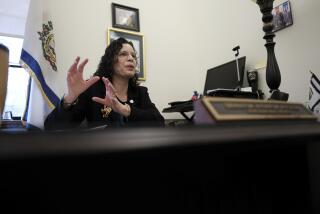Single Appalachian Mothers Start to Break Cycle of Poverty, Degradation : Education: Living below the poverty level, many Kentucky women have little to look forward to. But new training programs are making inroads.
- Share via
PRESTONSBURG, Ky. — Four years ago, Faith Campbell didn’t have much going for her.
With no job, only $50 a month in child support and a ninth-grade education, prospects for the 28-year-old single mother of four weren’t so bright. But Campbell had a spark, and she was lucky enough to find someone who could fan it into a flame.
Today--thanks to Jean Rosenberg, director of the Single Parent and Homemaker Career Development Program--Campbell has a part-time job and is on the dean’s list at Prestonsburg Community College. She expects to have two associate’s degrees by next May, in arts and management.
“I wasn’t really doing anything but staying home before I met Jean,” she said.
Campbell has forged some inroads, yes. But she still helps make up a disturbing statistic about Appalachia, historically poor and made poorer by the loss of more than 93,000 well-paying coal jobs since 1981.
Like Campbell, 64% of the female-headed households with minor children in Appalachian Kentucky were living in poverty in 1990, according to a report by Child Trends Inc. of Washington, D.C. The more than 16,000 families represented the highest percentage in the entire 13-state Appalachian region, where poverty in single-mother homes averages 47%. The national rate is 42%.
In portions of some eastern Kentucky counties, 100% of the single-mother homes are below the poverty rate, according to a study released in April by the University of Kentucky Appalachian Center.
Services like Rosenberg’s must battle against generations of abuse, degradation and deprivation.
“We certainly have a long history of not encouraging people to complete their formal education--period,” said Rosenberg, whose 7 1/2-year-old program serves five counties.
She and others say that lack of education is even more stultifying for women, who fall into the culturally accepted tradition of marriage and childbearing--and, as a result, simply have no idea how to enter the job market.
In fact, people who work with Appalachian women find themselves first focusing on such basic things as eating habits and hygiene.
“You have to start from ground zero,” said Katie Newsome, a staff assistant with the Community Health Advocates Program, which also operates in five counties.
The program recently completed its third annual weeklong Women’s Leadership Conference, which offered everything from breast cancer workshops, Pap smears and self-esteem seminars to haircuts, manicures and country line-dancing lessons.
More important, Newsome said, the women got time away from what can sometimes be a crushing household isolation.
“They want something for themselves,” she said. “It’s not just selfish. They’re renewing themselves so they can give back to their families, their communities, their churches.”
That is much the same mission of the New Opportunities School for Women at Berea College. Twice a year, women from a half-dozen Appalachian states spend three solid weeks at the school learning how to make progress in their lives.
Jane Stephenson, the program’s founder and director, said 65% of the women who take part are either divorced, separated or widowed. Of the 14 attending a recent session, 13 had family incomes of below $10,000, she said.
“Most of them are so low in self-confidence because they’ve been put down by society and being on welfare,” Stephenson said. “Most of them feel like they’ve got nothing going for them.”
The Berea program’s focus is career development, but Stephenson also works on self-esteem. That includes giving every woman an afternoon job during the program, supplying them with an “interview suit” to use in their job hunts and having them read books about Appalachian women.
“They need to take pride in themselves and their culture,” she said. “We concentrate on books about strong Appalachian women, and they see themselves in those books.”
Rosenberg agrees that’s important.
“One of the unique challenges to a single parent in eastern Kentucky . . . is the fact that you don’t have role models,” she said. “We have such a depressed job market that people don’t have a sense that there can be anything out there.”
So, little by little, these programs are producing role models.
Of the 152 women who have participated in the Berea program, 70% are employed or in school, Stephenson said.
Rosenberg said more than 300 of her active participants are in community college or vocational education. And, of those, 27 have grade-point averages of 3.5 or better.
Newsome’s women don’t just measure their success in jobs found or degrees earned. Their victories also come, she said, in pounds shed, groups joined and doors opened.
All this can be illustrated by Faith Campbell, whose mother and two sisters have used Rosenberg’s support services.
Campbell said she’s looking forward to working with computers and possibly teaching someday. But, for now, she’s working on being an example to her children--especially her only daughter, 3-year-old Nikki Leigh.
“I think she’ll be successful,” Campbell said hopefully of her daughter. “She can do it on her own too.”
More to Read
Sign up for Essential California
The most important California stories and recommendations in your inbox every morning.
You may occasionally receive promotional content from the Los Angeles Times.










